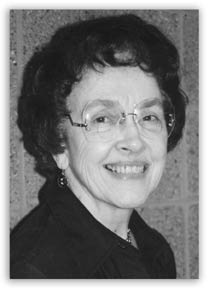DR. VERONICA MARY MAHER, IHM '51
 A single tree can produce fruit that holds the seeds to produce for generations. This is the immense potential of the work of Dr. Veronica Maher, IHM, professor and co-director of the Carcinogenesis Laboratory at Michigan State University. Under Maher's instruction and inspiration more than 50 young scientists have received advanced training in research and gone on to do important work of their own in the last 25 years. Maher has also directed and co-directed more than 40 graduate students; each of them earned a Ph.D. and has gone out into the world to conduct research, teach, and inspire other scientists.
A single tree can produce fruit that holds the seeds to produce for generations. This is the immense potential of the work of Dr. Veronica Maher, IHM, professor and co-director of the Carcinogenesis Laboratory at Michigan State University. Under Maher's instruction and inspiration more than 50 young scientists have received advanced training in research and gone on to do important work of their own in the last 25 years. Maher has also directed and co-directed more than 40 graduate students; each of them earned a Ph.D. and has gone out into the world to conduct research, teach, and inspire other scientists.
Maher graduated from Marygrove in 1951 with a Bachelor of Science in Biology. "I entered Marygrove at the age of 16. When I graduated at age 20 I had not only a marvelous education, but also a deep spirituality and a strong conviction that with God's help, a woman could contribute greatly to the welfare of others and really accomplish great things," she said.
Following her graduation, Maher entered the Congregation of the Sisters, Servants of the Immaculate Heart of Mary. In 1958 she received a Master of Science in Biology from the University of Michigan and spent the next six years teaching high school biology, mathematics, and religion at St. Mary Academy in Monroe, Michigan. Then, in 1964, with a scholarship from the National Cancer Institute of the National Institutes of Health, she attended the University of Wisconsin where she studied at the McArdle Laboratory for Cancer Research and earned a Ph.D. in molecular biology.
"Veronica's Ph.D. dissertation demonstrated for the first time that chemical carcinogens could, indeed, cause genetic changes in DNA, could produce mutations. This data, published in 1968, altered the thinking of scientists at that time and turned their attention to the critical role DNA mutations could play in causing cancer," said Mary Joseph Maher, IHM, who nominated Maher.
In 1969, after a year of post-doctoral research at Yale University School of Medicine, Maher joined the faculty of Marygrove College as an assistant professor of biology and conducted research on mutagenesis at Marygrove and at the Michigan Cancer Foundation. In 1971 she resigned to devote full time to research as chief of the Carcinogenesis Laboratory at the Foundation. There she pioneered methods for working with human cells and began investigating the role of DNA repair in protecting human cells from agents that can cause cancer.
In 1976 she was invited to join the faculty of Michigan State University as an associate professor in the College of Osteopathic Medicine and to co-found the Carcinogenesis Laboratory. She was appointed associate professor in the department of Microbiology and Molecular Genetics and also in the department of Biochemistry and Molecular Biology. In 1980 she was promoted to professor. She currently serves as faculty member and co-director of the Carcinogenesis Laboratory as well as associate dean for graduate studies.
In recognition of her contributions to the university, the nation, and the international community of scientists in her field, Maher was awarded the highest honor at Michigan State University, the title of University Distinguished Professor, a title held by less than 1.5 percent of the faculty.
Maher credits Marygrove with providing role models for young women.
"Having women in the roles of president, dean, and department chairperson made me ready to exert my own influence-first and foremost as an IHM Sister in my religious order, but also as a woman who has had the opportunity to pursue knowledge as a scientist and to inspire numerous other scientists," she said.
"My research into the molecular biology of cancer brings me deeper and deeper into knowledge beyond the grasp of most persons. It is this verse from scripture expressing God's knowledge and imminence in all of nature that inspires me: 'The Spirit of the Lord has filled the whole world."
